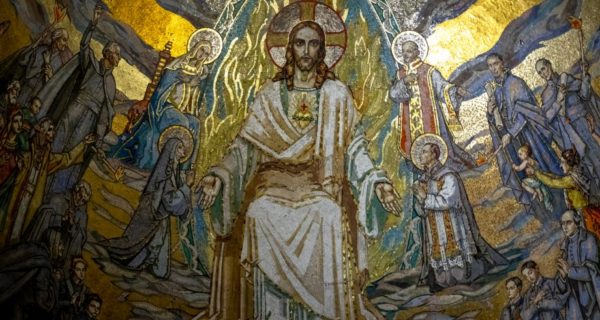Some observations on the “who loves Jesus more” issue between Christians and Muslims: I see it run on cycle sometimes, with both sides seeming to miss the whole point of the debate to begin with. Like, it should be fairly evident by now that our argument has very little to do with whether or not we all love/respect/admire Jesus…as a man. I mean, what’s there not to like, really, in His basic teaching and healing ministry?
But the split point comes right in there, because Christianity as a religion isn’t primarily based upon admiring a dude. And neither, to be fair, is Islam. Both are about worshiping and coming into communion with God. The question is how does God come into communion with us, and was Jesus, in fact, the ultimate source of that communion, the incarnate Emmanuel, God-made-Man who pitches His tent among us?
Yeah. Rad stuff. And it’s supposed to be, and there’s no getting around it. Either He is divine, or He isn’t divine, but if you believe He is, you have to do tons more than just love/admire/respect Him; you have to outright worship and obey Him. If you don’t believe it’s possible for God to become man, then you probably won’t even consider it on a “can it happen” level much less on a “did it happen” level.
But, of course, this does bring up the point of whether we are really loving two different figures, or concepts of figures. The ontological nature of Christ as the Second Person of the Blessed Trinity and the God-Man is not negotiable in orthodox Christian thought. So when we say we love Jesus, we’re talking about loving the divine incarnation sent to redeem us from our sins. When a Muslim says it, they mean they’re loving one of the many messengers of God.
And yeah, that is a pretty major demotion from a Christian perspective. The understanding of Jesus’ nature, mission, and even ultimate fate diverges quite decisively in mainstream Islamic thought and ultimately relegates Him to a subplot hero instead of being the main character in the drama of salvation. The oft-told story of Muhammad viewing Jesus as a brother is no doubt true, but that was *his* form of Jesus, decidedly declawed from the Christian version, who is simply a fellow prophet of the One and, according to Muslim understanding, monolithic God.
Back to square one though: Are there areas Christians and Muslims do click on with Jesus? Absolutely. Because here’s the thing, Christians *do* believe Jesus was fully human, and Muslims, since their sole focus is on his humanity as a “spirit come forth from God”, actually have a lot to say about that aspect (here’s looking at you, Rumi), about the preacher and healer and aesthetic and wanderer who called for repentance and reformation. This extends into a deep and abiding reverence for His Mother Mary. Well and good and fair enough.
And heck, who’s denying on this end that He was a prophet? Of course He was. He prophesied all the time, including about His death on the cross, if one is to take the Gospels seriously, though that’s another bone of contention, i.e. the reliability of the Gospels, not to even start on the teaching authority of the Church. For Muslims, the ultimate reference point for whether a thing is true or false is found in the Quran. That’s really the crossroads point: we’re getting our information, and understanding of what is authoritative, from different places.
At the end of the day, I think it comes down to whether theology that really shakes stuff up rings true to your understanding of the universe, or if the rad stuff basically makes you assume it was just weird people run amok, for God wouldn’t make you do mental gymnastics with mysteries well beyond our ken. For myself, I totally think God works in ways we least expect and loves to rattle us with paradox and bust open our boxes with shock factor. I think He likes to throw the ice cube in the soup and watch it crack.
Maybe that’s what the concept of the Incarnation, contingent upon the Trinity, is: It’s a cracking, a tearing, of curtains in the temple and seals on the tomb, and stone table split down the center, and indeed, a chasm that separates Christianity from all other faiths, making it a scandal and an absurdity to those on the outside looking in. This must either prove it to be our greatest foolishness or our greatest prize, for it is a strange, mysterious thing to cling to unto death.
